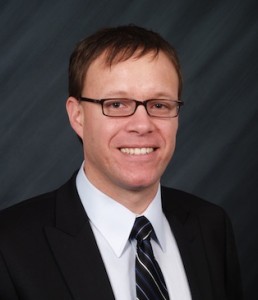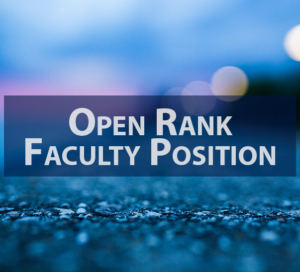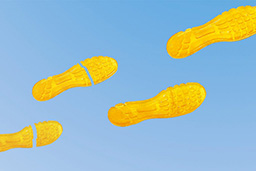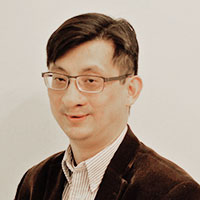Uncategorized
Prof. Norato joins the Editorial Board of the ASME Journal of Mechanical Design
 Dr. Julián Norato, associate professor of Mechanical Engineering, has been named Associate Editor of the ASME Journal of Mechanical Design. This archival journal publishes papers on and embraces broad, interdisciplinary aspects of engineering design research.
Dr. Julián Norato, associate professor of Mechanical Engineering, has been named Associate Editor of the ASME Journal of Mechanical Design. This archival journal publishes papers on and embraces broad, interdisciplinary aspects of engineering design research.
His current research interests lie in incorporating failure, geometric, manufacturing and cost requirements in computational topology and shape optimization techniques for the design exploration of novel and highly efficient structures and architected materials. Dr. Norato is a 2020 Air Force Research Lab Summer Fellow, the recipient of the 2019 ASME Design Automation Young Investigator Award, a 2018 NSF CAREER awardee and a recipient of the 2017 Office of Naval Research Young Investigator Program award. He also serves as Review Editor for the Journal of Structural and Multidisciplinary Optimization.
Prof. Nguyen to Develop Self-Administered Microneedle COVID-19 Vaccine Technology
Prof. Thanh Nguyen has received funding from the U.S. Department of Health and Human Services (Biomedical Advanced Research and Development Authority, or BARDA) to develop a single-use, self-administered microneedle vaccine technology for infectious diseases, including COVID-19.
For more details, read the full story on UConn Today:
Two Faculty Searches for the 2019-2020 Academic Year
 For the 2019-202 academic year we have two open positions: one open rank and the second at the Assistant or Associate professor levels. The start date is August 2020.
For the 2019-202 academic year we have two open positions: one open rank and the second at the Assistant or Associate professor levels. The start date is August 2020.
We are looking for exceptional candidates in advanced and digital manufacturing. Areas of interest include, but are not limited to:
- intelligent robotics and automation,
- applied controls,
- additive manufacturing,
- computational design of products and processes,
- uncertainty quantification and reliability, and
- data analytics and machine learning informed by physics.
To apply follow this link.
Fueling the Fire: Studying Flame Behavior to Improve Combustion Systems
The power you feel underneath you when you’re on a plane as it takes off is tremendous. The physics that enable the remarkable feat of lifting a 175,000-pound midsize commercial aircraft into the sky and keeping it there are just as incredible – and complicated.
There are four components to a commercial aircraft gas turbine engine: the fan that produces most of the thrust, the compressor, which compresses the incoming air, the combustor which burns the fuel to create high-energy gas, and the turbine that produces work from that gas to power the fan and exhaust to produce additional thrust.
The challenge in this system is keeping the flame in the combustor burning. Flame blowoff can occur when the air flow speed is very high, or the fuel-air mixture is weak so that the flame cannot be stabilized, so it moves downstream and eventually extinguishes itself.
University of Connecticut professor of mechanical engineering, Baki Cetegen has received $320,000 from the National Science Foundation to study this problem by investigating how different fuels and high levels of flow turbulence affect the occurrence of flame blowoff.
Chih-Jen (Jackie) Sung Named Combustion Institute Fellow
By: Eli Freund, Editorial Communications Manager, UConn School of Engineering
The UConn School of Engineering is proud to announce that Mechanical Engineering Professor Chih-Jen Sung has been recognized as one of the 2019 Class of Fellows for The Combustion Institute.
Sung joins a class of 38 accomplished international scholars from industry, academia, and the public sector, and was recognized for “novel contributions to flame dynamics and structure, and development of rapid compression machines to enhance understanding of low-temperature chemistry.”
Read the School of Engineering announcement.
A new, nature-inspired self-healing rubber developed by Prof. Li and his collaborators from USC.

A new paper published by Prof. Ying Li and his collaborators from University of Southern California in NPG Asia Materials provide the details of a new class of self-healing rubber that is inspired by the healing of natural tissues.
For more details, please see the news article from UConn Today.
Jiong Tang to serve as the General Chair for ASME IDETC & CIE 2019
 Prof. Jiong Tang will serve as the general conference chair for the American Society of Mechanical Engineers’ international annual design conference in Anaheim CA. The 2019 ASME International Design Engineering Technical Conference (IDETC) and Computers and Information in Engineering Conference (CIE) will take place between August August 18 – 21, 2019 at the Anaheim Convention Center.
Prof. Jiong Tang will serve as the general conference chair for the American Society of Mechanical Engineers’ international annual design conference in Anaheim CA. The 2019 ASME International Design Engineering Technical Conference (IDETC) and Computers and Information in Engineering Conference (CIE) will take place between August August 18 – 21, 2019 at the Anaheim Convention Center.
The Challenge of Modeling and Simulation for Molten Salt Nuclear Reactors
 Abstract: The rapidly expanding interest in molten salt reactors (MSRs), particularly as small modular reactors, is resulting in the generation of multiple design concepts with efforts at a variety of early developmental stages. Various companies and organizations in a number of countries are looking at such systems to be safe, economical, and rapidly deployable power systems. For efficient design, operation, and regulation of MSRs it will be necessary to have the ability to simulate reactor behavior across the spectrum from neutronics and fluid dynamics to corrosion and salt phase behavior. MSRs have not been considered since the original prototype, the Molten Salt Reactor Experiment, that ran successfully from 1965-1969 at Oak Ridge National Laboratory, and thus there is little legacy of useful information. Aspects of potential modeling and simulation of future molten salt reactors will be discussed with respect to the unique challenges they present. Among the current needs are extensive thermophysical and thermochemical properties describing salts and other reactor materials. In particular, the ability to compute chemical and phase equilibria (e.g., potential solid phase precipitation) throughout the molten salt loop(s). Activities and opportunities in these areas will be discussed as contributing to development of a knowledge base for molten salt reactor technology.
Abstract: The rapidly expanding interest in molten salt reactors (MSRs), particularly as small modular reactors, is resulting in the generation of multiple design concepts with efforts at a variety of early developmental stages. Various companies and organizations in a number of countries are looking at such systems to be safe, economical, and rapidly deployable power systems. For efficient design, operation, and regulation of MSRs it will be necessary to have the ability to simulate reactor behavior across the spectrum from neutronics and fluid dynamics to corrosion and salt phase behavior. MSRs have not been considered since the original prototype, the Molten Salt Reactor Experiment, that ran successfully from 1965-1969 at Oak Ridge National Laboratory, and thus there is little legacy of useful information. Aspects of potential modeling and simulation of future molten salt reactors will be discussed with respect to the unique challenges they present. Among the current needs are extensive thermophysical and thermochemical properties describing salts and other reactor materials. In particular, the ability to compute chemical and phase equilibria (e.g., potential solid phase precipitation) throughout the molten salt loop(s). Activities and opportunities in these areas will be discussed as contributing to development of a knowledge base for molten salt reactor technology.
Biographical Sketch: Ted Besmann is Professor and SmartState Chair for Transformational Nuclear Technologies, directing the General Atomics Center at the University of South Carolina. Dr. Besmann received his B.E. in chemical engineering from New York University, M.S. in nuclear engineering from Iowa State University, and Ph.D. in nuclear engineering from the Pennsylvania State University. In 1975 he joined ORNL and subsequently became a Group Leader and Distinguished Member of the Research Staff. Besmann’s nearly 40 years at Oak Ridge National Laboratory included a joint appointment in the Nuclear Engineering Department at the University of Tennessee. Besmann has over 160 refereed publications, and is a Fellow of both the American Ceramic Society and the American Nuclear Society. He is chair of the Organization for Economic Cooperation and Development-Nuclear Energy Agency (OECD-NEA) Working Party on Multi-Scale Modeling of Nuclear Fuels and Structural Materials and is vice-chair of their Thermodynamics of Advanced Fuels-International Database program. Dr. Besmann is also Co-Director of the DOE Energy Frontier Research Center led by USC, the Center for Hierarchical Waste Form Materials.